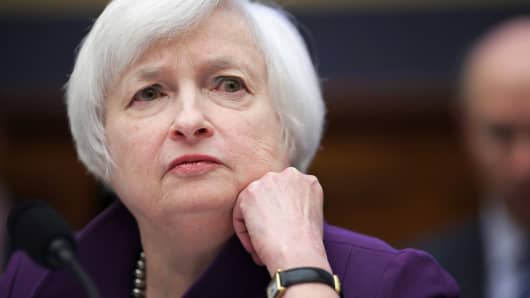
It’s less likely the Federal Reserve will raise interest rates again next month, according to a growing number of economists. If they’re right, it compounds the problems big banks on Wall Street are facing.
Most banks ended last year pricing in expectations the Fed would hike interest rates three or four times.
Banks including JPMorgan, Bank of America and Citigroup stand to make billions as the Fed increases interest rates. Collectively, the banks said rates being raised to 1 percent, or 100 basis points, over a 12-month timeframe equates to more than $9 billion in interest income, the revenue derived from lending.
Now, the idea that the Fed will raise rates to 0.5 percent in March has been discounted. Most banks’ top economists say they’re expecting two or three rate hikes in 2016, which means the banks could yet reap billions in interest income that has been sorely missed since the financial crisis. Still, it’s not clear banks will get even half the interest rate increases they expected this year.
Goldman Sachs took the probability of a March interest rate hike off the table in a note from economists Jan Hatzius and Zach Pandl on Wednesday.
“Financial conditions have tightened meaningfully, and officials sound inclined to take more time to gather data and observe market developments,” the economists wrote.
They still think — or hope — that the Fed will hike rates three times in 2016. If the central bank doesn’t, it will cost Goldman, and every other bank on Wall Street.
Staggering interest rate hikes will slow banks’ interest income; it comes after zero-interest policies have trimmed banks’ net interest margin for years in the wake of the financial crisis.
Wall Street banks’ shares are getting hammered to kick off 2016, as investor fears over factors including their exposure to energy loans has stocks underperforming already. In recent days, as the price of oil appears to be reaching a bottom and markets began to regain their footing, bank stocks have continued to lag.
Read MoreThis bank is most immune to falling oil prices
“The debate is whether investors have already baked that expectation in,” Jefferies’ consumer banks analyst Ken Usdin said in an interview, regarding the expected delay in rate hikes.
While big banks are feeling the pain from energy loan losses and less-than-expected interest income in 2016, Usdin points out regional U.S. banks also stand to lose revenue if the Fed drags its feet on rate increases.
[“source -pcworld”]
